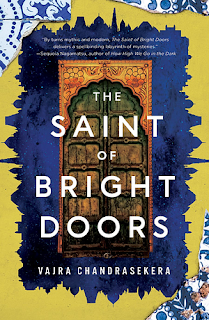Find a Review
Book reviews from Robin, co-host of the Books That Burn podcast. Bookshop links are affiliate links, we may receive a small commission if you purchase from our Bookshop. This content is CAN credentialed, which means you can report instances of harassment, abuse, or other harm on their hotline at (617) 249-4255, or on their website at creatoraccountabilitynetwork.org.
Featured
- Get link
- X
- Other Apps
The Saint of Bright Doors by Vajra Chandrasekera
Fetter was raised to kill, honed as a knife to cut down his sainted father. This gave him plenty to talk about in therapy.
He walked among invisible powers: devils and anti-gods that mock the mortal form. He learned a lethal catechism, lost his shadow, and gained a habit for secrecy. After a blood-soaked childhood, Fetter escaped his rural hometown for the big city, and fell into a broader world where divine destinies are a dime a dozen.
Everything in Luriat is more than it seems. Group therapy is recruitment for a revolutionary cadre. Junk email hints at the arrival of a god. Every door is laden with potential, and once closed may never open again. The city is scattered with Bright Doors, looming portals through which a cold wind blows. In this unknowable metropolis, Fetter will discover what kind of man he is, and his discovery will rewrite the world.
PUBLISHER: Tordotcom
YEAR: 2023
LENGTH: 356 pages
AGE: Adult
GENRE: Fantasy
RECOMMENDED: Highly
Queer Rep Summary: Lesbian/Sapphic Secondary Character(s), Gay/Achillean Main Character(s), Genderqueer/Nonbinary Secondary Character(s).
THE SAINT OF BRIGHT DOORS is a very cool and weird fantasy about strange circumstances, toxic family, and the strain of the world changing when you aren't looking.
Fetter was trained by his mother to be an assassin, so that one day he would kill her and his father, as part of some grand plan that she doesn't quite explain to him. She tells him the individual steps and what his role will be, but it's not until much later that he learns the history behind her hatred for his father. Fetter grows up and leaves assassination behind with a move to the big city, but the city is gleefully bureaucratic, using classism and race science to tacitly (and forcefully, if necessary) enforce boundaries around its residents and make it easy to exist but difficult to thrive.
The worldbuilding is precise without getting bogged down in specifics. We don't need to know exactly what race science Luriat uses to sort its residents, classify its citizens, and determine which persons will have no recourse if the cops assault them. What matters is the shape of it, as these intermittently visible rules tug at Fetter and direct the course of his adult life. The rules in his childhood were no less arcane, and in some respects were clearer, there, at least, he had a goal. Now, he finds himself in the company of others who were passed over by destiny, but are determined to eke some kind of purpose out of their existence. The Bright Doors have a chance at being that purpose for Fetter. They're at once mundane and strange, so ubiquitous and inevitable that the specter of them shapes the plans for every building, stopping any true privacy by requiring doors never fully be opaque, lest they turn into portals to somewhere else.
I'm torn about the ending. There's a perspective shift which I found both innovative and jarring. Until that point I thought I knew where things were going, then I was ripped out of that certainty even as other things were resolved. This is definitely on purpose, as it viscerally recreates a small version of the way Fetter feels at various stages of the story. I like how it's done, but it creates feelings I wouldn't regularly seek out in fiction.
Moderate CW for religious bigotry, confinement, fire/fire injury, child abuse, epidemic, blood, gore, kidnapping, police brutality, violence, war, murder, death.
Minor CW for alcohol, excrement, homophobia, vomit, terminal illness, cancer, injury detail, parental death.
- Get link
- X
- Other Apps
Popular Posts
The Rise and Fall of Snow: Why the Hunger Games prequel is good, actually
- Get link
- X
- Other Apps
When Miserable People Get Happy Endings: "Unlikeable" Protagonists in Alexis Hall's Writing
- Get link
- X
- Other Apps

Comments
Post a Comment